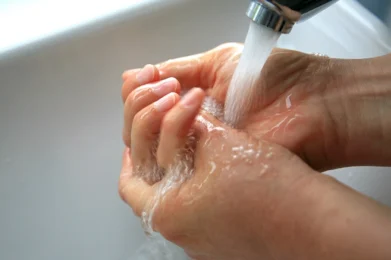In This Article:
- Heat exhaustion symptoms include profuse sweating, weakness, muscle cramping, nausea and/or vomiting, headache, or lightheadedness. Fainting may occur in extreme cases.
- Heatstroke may be life-threatening and includes symptoms like high fever, rapid heart rate, loss of consciousness and hot, red, extremely dry or moist skin.
- To prevent heat-related illness, limit alcohol and caffeine intake, drink lots of water and wear light-colored, loose-fitting clothes.
We’re in the heat of summer here in the Valley, and it’s more important than ever to take extra good care of your health to make sure you’re staying safe in these extreme temperatures. Going outside during the scorching Arizona summer can quickly cause thirst, headaches and dryness.
It’s normal to feel extra tired and lazy when you’ve been out in the sun for a while – but how do you know if your reaction to the heat is approaching a dangerous level? Both heat exhaustion and heat stroke are common this time of year, and we have tips on how to recognize the signs in yourself and your loved ones.
Causes of heat-related illness
According to Healthline, heat-related illnesses develop when the body reaches a point where it is unable to cool itself down. Sweat helps keep us cool, and too much heat exposure or hard physical labor in the sun can prevent the body from being able to produce enough sweat to cool us down.
The amount of sweat we produce when we get hot also causes us to lose a lot of water, meaning we need to increase the amount of water we drink in warmer months. Not drinking enough water in the heat can quickly lead to dehydration.
Signs of heat exhaustion
The most common cause of heat exhaustion is overexerting yourself in the sun for too long. Other causes include dehydration, wearing heavy clothing and consuming alcohol.
If you have any of the following symptoms, you may be experiencing heat exhaustion:
- Profuse sweating
- Weakness
- Muscle cramping
- Nausea and/or vomiting
- Headache
- Lightheadedness
- Fainting (in extreme cases)
It’s important to begin treatment at the first signs of heat exhaustion. Moving to a cool environment and rehydrating with water or electrolyte-heavy drinks (i.e., Gatorade) can help minimize symptoms. You should also try to lie down as soon as possible, or at least stop performing strenuous activity.
When left untreated, heat exhaustion can evolve into a heat stroke, which is considered a medical emergency.
Signs of heat stroke
Heat stroke can be a potentially life-threatening condition if left untreated for too long. Heat exhaustion can evolve into a heat stroke fairly quickly if not taken care of as soon as possible.
If you or a loved one are experiencing the following symptoms of heat stroke, seek emergency medical help as soon as possible:
- Fever higher than 103º
- Rapid heart rate
- Loss of consciousness
- Hot, red, extremely dry or moist skin
In the case of a heat stroke, it’s not recommended to give the person anything to drink. Instead, move them to a cooler area or place them in a cool bath until help arrives. You can also try applying ice packs to the neck, armpits and groin.
If not treated immediately, heat stroke can cause damage to the body’s vital organs, including the lungs, liver, kidneys, circulatory system and even the brain.
How to prevent heat-related illnesses
The best way to stay safe in the heat is to limit the amount of time you spend outside in extreme temperatures and keep hydrated throughout the day. The following precautions may also help you avoid overheating:
- Limiting the amount of alcohol or caffeine you consume before or while spending time in the heat, as these drinks dehydrate. If you do consume either of these, drink plenty of water before, during and after.
- Drink two to four cups of water every hour you spend outside in the heat.
- Wear light-colored, loose, lightweight clothing and a hat
- If you are on any prescription medication for heart conditions, ask your doctor if it may make you more sensitive to heat
Valleywise Health is here to keep you safe and healthy all summer long. If you or a loved one are experiencing a medical emergency, such as heat stroke, contact our Emergency & Trauma Department right away.







